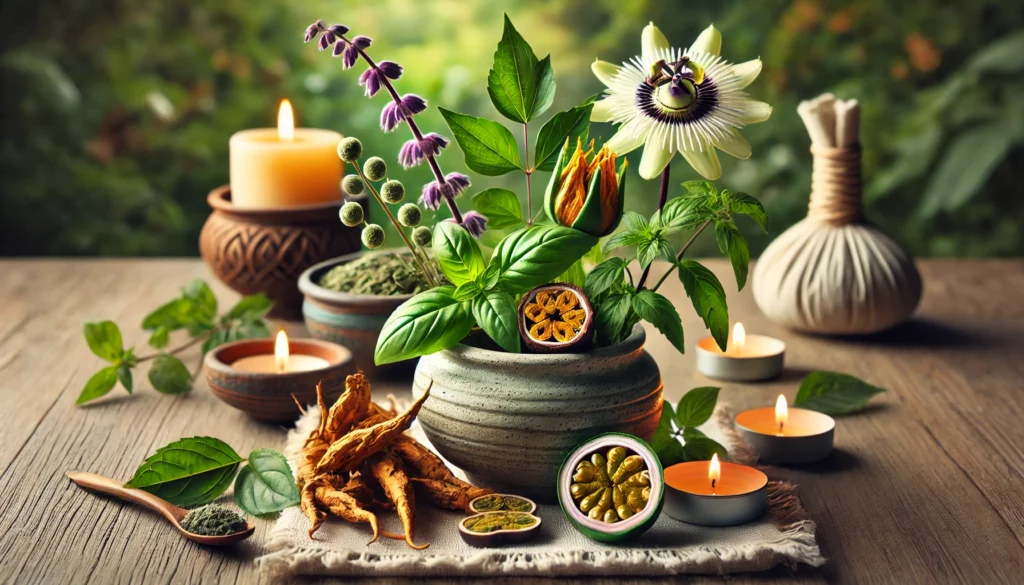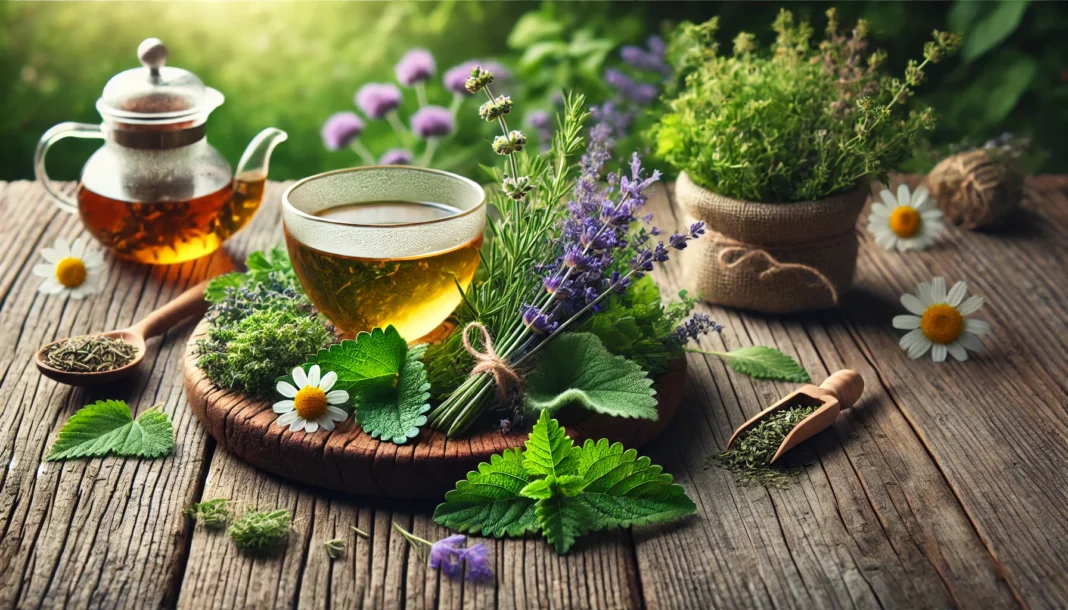In recent years, a growing number of individuals have turned to holistic approaches to manage mental health conditions, particularly anxiety and depression. Concerns over the side effects of conventional pharmaceuticals, combined with a broader cultural shift toward natural living, have sparked interest in alternatives to selective serotonin reuptake inhibitors (SSRIs). This growing movement is not merely a fleeting trend but a reflection of a deeper desire to harmonize well-being with nature. As individuals seek out natural SSRIs for anxiety, they are also exploring plant-based options that support mood regulation without the risks often associated with traditional medications. The question arises: are there effective, science-backed natural alternatives to SSRIs for anxiety that can offer relief without compromise?
You may also like: How Long Does It Take for Muscles to Heal? A Science-Backed Guide to Athletic Recovery & Regeneration
To answer this, we must first understand the complexity of mood disorders and the role serotonin plays in emotional regulation. SSRIs like Lexapro, Prozac, Zoloft, Duloxetine, and Sertraline work by preventing the reabsorption of serotonin in the brain, effectively boosting its availability. Serotonin is a neurotransmitter often referred to as the “feel-good chemical,” and its presence is crucial to maintaining emotional stability. However, while these medications can be effective, they often come with side effects ranging from weight gain and fatigue to emotional numbness and dependency. As a result, individuals searching for natural antidepressants or natural replacements for Lexapro and Zoloft are not simply rejecting modern medicine; they are seeking sustainable, holistic solutions that align with their health philosophies and lifestyles.

Understanding the Science Behind Natural SSRIs
The term “natural SSRIs” is somewhat metaphorical, as no herb or plant extract functions identically to synthetic selective serotonin reuptake inhibitors. However, several natural substances have been shown to influence serotonin levels and mood-regulating pathways in the brain. These compounds do not mimic SSRIs in a chemical sense, but they may offer similar benefits, such as alleviating anxiety and improving mood. This makes them valuable tools for those seeking natural alternatives to SSRIs for anxiety.
Research in this area is promising. For instance, studies have highlighted the serotonergic effects of certain adaptogens and herbs, suggesting that they may help modulate neurotransmitters and reduce symptoms of mood disorders. Adaptogens are a category of herbs that help the body resist stressors of all kinds, whether physical, chemical, or biological. They play a particularly interesting role in natural SSRI antidepressants by promoting overall balance in the central nervous system. When individuals inquire about what the most effective natural antidepressants are, they are often pointed toward herbs that possess both mood-stabilizing and adaptogenic properties.
The mechanisms through which these substances work are diverse. Some, like St. John’s Wort, influence serotonin directly by inhibiting its reuptake, while others, such as Rhodiola rosea, act more indirectly by enhancing the body’s resistance to stress and fatigue. Still others may affect dopamine and norepinephrine, which also contribute to emotional well-being. In seeking a natural replacement for Zoloft or a natural alternative to Lexapro, it is essential to understand that the effectiveness of these herbs depends not only on their biochemical action but also on individual differences in metabolism, lifestyle, and overall health.
Natural alternatives to ADHD medications are also being explored for their ability to enhance mood and focus. These over-the-counter options are appealing to those who want symptom relief without a prescription.

St. John’s Wort: Nature’s Most Studied Mood Enhancer
Among all herbal remedies considered natural SSRIs, St. John’s Wort (Hypericum perforatum) holds a unique position due to the depth of scientific research supporting its efficacy. Widely used in Europe and gaining traction in North America, this flowering plant has been employed for centuries to treat mild to moderate depression. Its active compounds, hyperforin and hypericin, are believed to inhibit the reuptake of serotonin, dopamine, and norepinephrine—thus mimicking, to a degree, the action of traditional antidepressants.
Clinical studies have consistently shown that St. John’s Wort can be as effective as SSRIs like Prozac and Zoloft in treating mild to moderate depressive episodes, with fewer reported side effects. This has positioned it as a leading candidate for individuals exploring natural alternatives to Prozac for anxiety and depression. Moreover, its accessibility as an over-the-counter supplement adds to its appeal for those seeking non-prescription solutions.
However, this herb is not without its caveats. St. John’s Wort interacts with a range of medications, including birth control pills, anticoagulants, and even some chemotherapy drugs. Therefore, while it stands out as a natural substitute for Zoloft or Lexapro, individuals must consult healthcare providers before beginning supplementation. Despite these concerns, the popularity of this herb underscores a broader trend: people are increasingly willing to embrace plant-based medicines in pursuit of emotional well-being.

Rhodiola Rosea: Resilience Through Adaptation
Rhodiola rosea, often referred to as the “golden root,” is a flowering herb native to the cold, mountainous regions of Europe and Asia. Unlike St. John’s Wort, which has a more direct impact on serotonin pathways, Rhodiola functions as a powerful adaptogen. It helps the body resist physical, chemical, and emotional stressors by modulating the hypothalamic-pituitary-adrenal (HPA) axis and reducing cortisol levels. These actions make it particularly effective for individuals whose anxiety and mood disturbances stem from chronic stress and burnout.
Research has shown that Rhodiola can improve symptoms of fatigue, anxiety, and depression, especially in individuals experiencing high stress levels. This makes it a valuable natural SSRI alternative for those who may not respond well to traditional antidepressants or are seeking a gentler, more holistic approach. The herb has also been shown to enhance cognitive function and physical endurance, suggesting broader benefits for overall vitality and resilience.
For those exploring natural cognitive enhancers, Rhodiola may serve as an effective option. It is often included among natural Adderall alternatives due to its role in improving mental clarity and stamina. Rhodiola does not carry the same risk of side effects typically associated with synthetic antidepressants, such as nausea, dizziness, or withdrawal symptoms. Its ability to improve mental clarity and reduce exhaustion also makes it an attractive option for high-functioning individuals who want to maintain performance while addressing their mental health concerns. This herb is also increasingly viewed as a natural alternative to methylphenidate for improving focus and mental stamina, supporting cognitive health without overstimulating the nervous system.
Rhodiola’s versatility is one of its most compelling attributes. Whether used alone or in combination with other herbal remedies, it represents a robust option for those seeking natural alternatives to SSRIs for anxiety and mood support. Its historical use in traditional medicine, particularly in Russian and Scandinavian cultures, lends further credibility to its modern application.
Saffron: A Bright Addition to Natural Mood Support
Often associated with its culinary uses and high market value, saffron (Crocus sativus) has recently emerged as a powerful natural antidepressant. Clinical trials have shown that saffron supplementation can significantly reduce symptoms of depression and anxiety, often with efficacy comparable to SSRIs like Prozac and Lexapro. Its primary active compounds, including crocin and safranal, are believed to influence serotonin metabolism and antioxidant pathways in the brain.
What makes saffron particularly intriguing is its dual-action profile: not only does it promote emotional well-being, but it also offers neuroprotective and anti-inflammatory benefits. This multifaceted approach is essential in understanding what the most effective natural antidepressants look like—they go beyond mood regulation to support overall brain health. For individuals considering a natural alternative to Lexapro or seeking natural alternatives to Prozac for anxiety, saffron presents a well-rounded option with a favorable safety profile.
Moreover, saffron has shown promise in improving sleep quality, libido, and cognitive function, suggesting a broader scope of benefits that align with holistic wellness goals. Its sleep-enhancing properties further make it an intriguing option for individuals looking for natural alternatives to medications like Trazodone. While its cost may be higher than other herbs, the concentration of active compounds in high-quality saffron supplements means that even small doses can be effective. This makes it a practical addition to an integrative mental health regimen.
Given its growing body of scientific support and long history of use in traditional medicine, saffron is gaining recognition as a viable natural SSRI antidepressant. It represents a sophisticated alternative for individuals seeking a natural replacement for Zoloft or Lexapro, offering both efficacy and elegance in its therapeutic profile.
Passionflower and Valerian Root: Calming Allies for Anxiety
In the realm of herbal anxiety treatments, passionflower (Passiflora incarnata) and valerian root (Valeriana officinalis) are two time-honored remedies that continue to hold relevance in contemporary mental health discussions. While neither herb functions as a true natural SSRI, both exhibit anxiolytic effects that make them valuable components of a holistic strategy for emotional support.
Passionflower works by increasing gamma-aminobutyric acid (GABA) levels in the brain, promoting relaxation and reducing nervous system excitability. These properties have earned passionflower a place among the most respected natural alternatives to Xanax, making it particularly effective for individuals experiencing acute anxiety or insomnia related to stress. Valerian root, on the other hand, acts as a mild sedative and muscle relaxant, commonly used to treat sleep disorders and nervous tension. Its calming effects can be beneficial for those seeking natural alternatives to SSRIs for anxiety, especially when restlessness and sleep disruption are prominent symptoms.
These herbs can be especially useful when integrated into evening routines or during periods of heightened stress. Their gentle profiles make them suitable for individuals who are sensitive to more stimulating adaptogens or who are in the early stages of transitioning away from conventional medications. For those curious about a natural substitute for Lexapro or a natural alternative to Sertraline, incorporating passionflower or valerian root may provide initial relief while broader lifestyle changes take effect.
While not typically used as standalone solutions for clinical depression, these herbs can play a crucial supportive role within a comprehensive wellness plan. Their ability to promote calm without inducing dependency or significant side effects exemplifies the appeal of natural alternatives to SSRIs for anxiety and stress management.
Ashwagandha: The Ancient Adaptogen for Modern Stress
Ashwagandha (Withania somnifera) is a revered herb in Ayurvedic medicine, long celebrated for its rejuvenating and stress-reducing properties. As an adaptogen, ashwagandha supports adrenal health, reduces cortisol levels, and enhances the body’s resilience to stress—all of which are foundational to mood stability and emotional well-being. In recent studies, ashwagandha has demonstrated significant efficacy in reducing symptoms of anxiety and mild depression, making it a compelling natural alternative to SSRIs.
The herb’s active constituents, including withanolides, exhibit neuroprotective and anti-inflammatory effects. These properties make ashwagandha particularly effective in improving sleep, enhancing concentration, and supporting a balanced mood. Individuals exploring a natural alternative to duloxetine or looking for a natural replacement for Lexapro often find that ashwagandha’s cumulative benefits extend beyond immediate symptom relief, fostering long-term emotional resilience.
Ashwagandha is well-tolerated by most individuals and can be taken in various forms, including capsules, powders, and tinctures. It has also shown promise in supporting focus and reducing hyperactivity, particularly in those with attention challenges. Ashwagandha is frequently featured among herbal remedies for ADHD due to its balancing effects on the nervous system. It integrates seamlessly into daily wellness routines, providing consistent support for those navigating chronic stress, burnout, or emotional exhaustion. Its adaptogenic nature ensures that it does not overstimulate the nervous system, making it an ideal choice for sensitive individuals seeking natural SSRIs for anxiety and stress relief.
Ashwagandha is commonly recommended as a safe, evidence-based natural Adderall alternative for adults. Its stress-buffering effects and cognitive benefits are particularly useful during times of stimulant shortages. As interest continues to grow around what vitamin is a natural antidepressant or which herbs provide the most effective alternatives to antidepressants, ashwagandha remains at the forefront of evidence-based natural remedies. Its ancient lineage and modern validation create a powerful synergy for those committed to holistic healing.
Integrative Strategies and Nutritional Synergy
While herbal remedies play a central role in the search for natural alternatives to SSRIs, a comprehensive approach must also consider nutritional factors. Vitamins and minerals are essential to neurotransmitter function, and deficiencies can significantly impact mood and anxiety levels. For instance, B vitamins, particularly B6 and B12, are crucial for the synthesis of serotonin and dopamine. Magnesium supports nervous system regulation, while vitamin D plays a role in circadian rhythm and mood stabilization.
When individuals ask what vitamin is a natural antidepressant, they are often directed toward these foundational nutrients. Ensuring adequate intake through diet or supplementation can enhance the efficacy of herbal interventions and create a supportive environment for emotional healing. Omega-3 fatty acids, found in fish oil and certain plant sources, have also demonstrated antidepressant effects and may help bridge the gap between conventional and natural treatment modalities. Supporting focus and emotional health naturally requires careful consideration of supplement-drug interactions. Strategic use of supplements is essential, especially when medications like Adderall are part of a broader regimen.
Combining herbal remedies with nutritional support allows for a multi-layered approach that addresses the root causes of mood imbalances rather than merely masking symptoms. This method aligns with the rising interest in natural Modafinil alternatives, which seek to boost clarity and energy without pharmaceutical intervention. For example, someone transitioning off an SSRI like Lexapro or Zoloft might pair ashwagandha and Rhodiola with a B-complex supplement and magnesium glycinate to foster emotional stability. This integrative strategy reflects the principles of functional medicine, which seeks to understand and treat the whole person.
As individuals increasingly seek natural Lexapro alternatives or a natural replacement for Zoloft, they are not only looking for symptom relief but also sustainable wellness. Nutrition, when viewed through this lens, becomes an essential partner in the healing process—a silent but powerful ally to the more visible herbal interventions.
Frequently Asked Questions (FAQ) – Natural Alternatives to Antidepressants and SSRIs
What are the most effective natural alternatives to SSRIs for anxiety?
When exploring a natural SSRI for anxiety, it’s essential to consider efficacy, scientific backing, and personal biochemistry. Among the natural ssri antidepressants gaining attention are saffron, which studies suggest may regulate serotonin levels similarly to pharmaceutical SSRIs, and Rhodiola rosea, known for its adaptogenic stress-buffering properties. These remedies function as natural selective serotonin reuptake inhibitors by influencing neurotransmitter balance without some of the harsh side effects of synthetic drugs. Many people also ask what vitamin is a natural antidepressant—and B-complex vitamins, particularly B6 and B12, have shown notable effects on mood and anxiety regulation. If you’re searching for natural alternatives to SSRIs for anxiety, working with a naturopath or integrative psychiatrist can personalize the process for better outcomes.
How do natural antidepressants compare to conventional medications like Lexapro or Zoloft?
Natural antidepressants often offer gentler effects on the body, but that doesn’t mean they’re less effective for every case. Many individuals seek a natural alternative to Lexapro or a natural substitute for Zoloft due to side effects like weight gain, sexual dysfunction, or emotional blunting. Herbs like ashwagandha and St. John’s Wort may function as a natural replacement for Lexapro or serve as natural ssri alternatives by subtly modulating serotonin without causing sedation. While traditional antidepressants might work faster or be more potent, long-term lifestyle changes and consistent supplementation with natural prozac alternatives can yield sustainable emotional resilience. Always discuss transitions with a medical provider to ensure no interaction risks or withdrawal symptoms.
What are the best supplements considered natural alternatives to antidepressants?
If you’re asking “what are the most effective natural antidepressants,” several research-supported supplements rise to the top. Omega-3 fatty acids, for example, not only promote brain health but act as a natural ssri antidepressant by modulating inflammatory pathways implicated in depression. Magnesium glycinate is another widely used natural alternative to Zoloft due to its ability to ease anxiety and muscle tension simultaneously. Many individuals report that using a natural substitute for Lexapro, such as SAM-e, supports mood regulation with fewer cognitive side effects. As science continues to study these compounds, the line between supplements and medicine becomes more nuanced.
Some natural supplements also offer benefits for sexual wellness, addressing both emotional and physical aspects of vitality. For example, remedies supporting erectile function are often considered alongside mood-regulating options in holistic protocols.
Are there any natural SSRIs that can be used alongside therapy?
Absolutely. Many therapists now recommend natural SSRIs for anxiety as complementary tools within a larger therapeutic framework. For instance, someone might use a natural alternative to sertraline while engaging in cognitive behavioral therapy (CBT), finding that the blend reduces reliance on higher pharmaceutical dosages. This integrative approach can include natural alternatives to Lexapro for anxiety like L-theanine or the adaptogenic mushroom Lion’s Mane, both of which support neurological clarity. For individuals also prescribed stimulants, understanding serotonin interactions becomes especially important. Certain antidepressants may pair more safely with Adderall than others depending on their serotonergic activity.
Can natural SSRIs help with long-term mood stabilization?
Yes, several natural ssri antidepressants offer potential for sustained mood support when paired with lifestyle optimization. Long-term users of natural Prozac alternatives like turmeric extract (curcumin) often report reduced brain fog and improved cognitive flexibility, aligning with clinical findings that suggest it regulates inflammatory cytokines linked to mood disorders. Moreover, those seeking a natural substitute for Zoloft often find that combining dietary strategies with herbs like holy basil helps prevent relapse into depressive cycles. Some of these herbs also offer sustained energy and focus, acting as natural Vyvanse alternatives without the harsh stimulant effects. This dual action supports individuals managing both attention and mood challenges naturally.
What are some whole food strategies that support natural antidepressant effects?
Whole foods rich in tryptophan (such as turkey, oats, and eggs) can help the body produce serotonin naturally, serving as a dietary foundation for anyone seeking natural ssri alternatives. Fermented foods like kimchi and kefir enhance gut-brain communication, which has been increasingly linked to mood via the microbiome—acting as natural antidepressants in their own right. For those exploring alternatives to antidepressants, anti-inflammatory diets low in sugar and high in antioxidants are crucial. Even those taking a natural alternative to duloxetine often find better results when dietary improvements are included in the protocol. Food isn’t just fuel—it’s an integral part of emotional well-being.
Are there specific lifestyle habits that enhance the effectiveness of natural SSRIs?
Yes, lifestyle plays a critical role. People transitioning to a natural replacement for Zoloft or looking for a natural substitute for Lexapro often benefit from adding structured exercise, consistent sleep hygiene, and mindfulness practices. These lifestyle changes can enhance the bioavailability and impact of supplements like 5-HTP or saffron, both often used as natural alternatives to Lexapro for anxiety. As natural alternatives to SSRIs for anxiety work gradually, pairing them with habits that promote neuroplasticity accelerates outcomes. Journaling, social connectedness, and even structured volunteering can strengthen emotional resilience while using natural antidepressants.
What are the risks of using natural SSRI alternatives?
While natural doesn’t automatically mean risk-free, many natural ssri alternatives are considered low-risk when used appropriately. However, supplements like St. John’s Wort can interact with other medications, including hormonal birth control and blood thinners. When transitioning to a natural replacement for Lexapro, it’s important to taper slowly under professional supervision. Additionally, combining too many natural selective serotonin reuptake inhibitors can lead to serotonin syndrome, a rare but serious condition. This is especially important for individuals who are already taking prescription medications like Adderall with Zoloft or Lexapro. Understanding potential interactions and considering safer herbal alternatives under professional guidance can reduce these risks.
What is the difference between natural Lexapro and pharmaceutical Lexapro?
Natural Lexapro is a colloquial term referring to plant-based or supplemental options that may mimic some of the serotonin-regulating effects of the drug. Unlike pharmaceutical Lexapro, which is a synthetic SSRI, a natural alternative to Lexapro might include ingredients like saffron, magnesium, or omega-3s, which work more subtly and holistically. People looking for a natural substitute for Lexapro often seek fewer side effects, more energy, or improved sleep. However, the dosage precision and clinical strength of synthetic Lexapro are unmatched by most natural substitutes. Still, for mild to moderate anxiety, a thoughtfully structured natural alternative to Lexapro can be highly effective when monitored.
What role do vitamins play as natural antidepressants?
Vitamins, especially in bioavailable forms, are foundational in any discussion about natural antidepressants. If you’ve ever wondered “what vitamin is a natural antidepressant,” the answer often includes vitamin D, B-complex (especially B6, B9, and B12), and magnesium. These vitamins regulate neurotransmitters like serotonin and dopamine, critical to emotional balance. People searching for a natural SSRI for anxiety often begin with lab testing to check for deficiencies that might be corrected with supplementation rather than medication. For those using a natural alternative to sertraline, vitamins act as synergistic allies, amplifying therapeutic effects without pharmaceutical intervention.
Conclusion: Embracing a Holistic Path to Mental Wellness
The pursuit of natural SSRI alternatives reflects a broader societal shift toward personalized, holistic approaches to health and well-being. While conventional SSRIs like Prozac, Lexapro, Zoloft, Duloxetine, and Sertraline remain essential tools for many, the desire for natural antidepressants has grown in tandem with increased awareness of their limitations. Herbal remedies such as St. John’s Wort, Rhodiola rosea, saffron, ashwagandha, passionflower, and valerian root offer promising options for those seeking a more natural path to emotional balance.
These plant-based alternatives are not one-size-fits-all solutions, nor should they be seen as direct replacements for pharmaceutical interventions without proper guidance. However, for individuals committed to exploring alternatives to antidepressants—those searching for a natural substitute for Lexapro or a natural replacement for Zoloft—these herbs represent a meaningful starting point. Integrating them with nutritional strategies, lifestyle modifications, and professional support can lead to a more resilient, vibrant, and empowered state of mental health.
As the conversation around natural selective serotonin reuptake inhibitors continues to evolve, so too does our understanding of what true wellness entails. In embracing natural SSRI antidepressants and nurturing our connection to the earth’s healing resources, we move closer to a model of mental health that honors both scientific rigor and ancestral wisdom. The journey is deeply personal, yet universally resonant—offering hope, relief, and transformation for those willing to walk the holistic path.
herbal antidepressants, adaptogenic herbs for anxiety, mood-enhancing botanicals, serotonin boosting herbs, plant-based mood stabilizers, holistic anxiety solutions, calming herbal supplements, anxiety relief without medication, mood support supplements, natural brain health supplements, functional herbal medicine, herbal adaptogens, neurotransmitter support herbs, alternative depression therapies, herbal wellness routines, integrative mental health, botanical antidepressant alternatives, holistic mood management, stress-relieving plants, traditional herbal remedies
Further Reading:
10 Tips to Speed Recovery After Exercise
10 ways to recover from a workout faster
The Science of Muscle Recovery: How to Recover Faster and Train Better
The information contained in this article is provided for general informational purposes only and is not intended to serve as medical, legal, or professional advice. While NewsHealthWatch strives to present accurate, up-to-date, and reliable content, no warranty or guarantee, expressed or implied, is made regarding the completeness, accuracy, or adequacy of the information provided. Readers are strongly advised to seek the guidance of a qualified healthcare provider or other relevant professionals before acting on any information contained in this article. NewsHealthWatch, its authors, editors, and contributors expressly disclaim any liability for any damages, losses, or consequences arising directly or indirectly from the use, interpretation, or reliance on any information presented herein. The views and opinions expressed in this article are those of the author(s) and do not necessarily reflect the official policies or positions of NewsHealthWatch.

